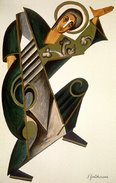NPR : Summer's Here: Grills Catch Fire
NPR : Summer's Here: Grills Catch Fire: "So, assume you have a shiny new grill. How do you get the best from it? Here are a few pointers:
· Maintain your grill as you would a new car -- well, as some of you would. Keep it clean, both inside (especially the cooking grates) and out, so it doesn't discolor.
· Grilling is more than just dropping food onto a flame and joining the volleyball game for 10 minutes. Some foods benefit from the 'direct heat, indirect heat' treatment. For example, a thick steak should be placed over the hottest part of the fire until it chars and develops a nice crust, then moved to a burner on a lower setting to continue cooking without burning. Most medium to large gas grills have two adjustable burners, one left, one right. If using charcoal or wood, move the food to the perimeter of the grate where the heat is less intense. Flip the steak and repeat. Cuts of meat 3/4-inch thick and thinner do not have to be moved because they cook quickly.
· Use long tongs to grasp food and rely on a meat thermometer. Experienced cooks know how to judge the doneness of a steak or thick filet of tuna by pressing them with their fingers. Amateurs should not try to show off this way -- it's safer and more accurate to use a thermometer. Steaks are rare at 145 degrees Fahrenheit, medium at about 160 degrees. Since meat and seafood continue to cook a minute or two after they are pulled from the heat, remove them a minute or so early to assure desired level of doneness.
· Let the meat rest. Sometimes when I am grilling, shortly before the food is cooked, I find myself surrounded by a wolf pack of hungry eaters. Don't give in to the rabble-rousers. When a steak is removed from the fire, it definitely needs a few minutes of downtime for the juices to redistribute."

No comments:
Post a Comment